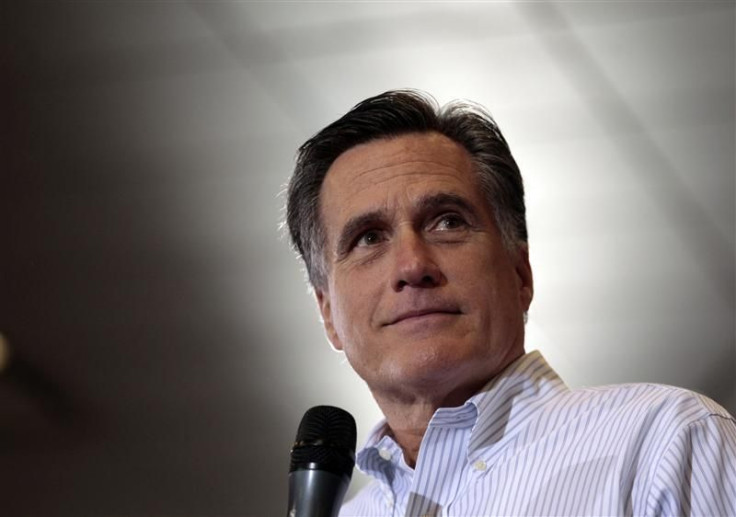Mitt Romney - Is He Too Old To Be US President?
Analysis

He has survived the most circuitous -- and certainly one of the wildest, most ridiculous, accusation-filled major party nominating processes in the modern era -- and in doing so, he has revitalized the Republican Party, which now has a roughly 50/50 chance of winning the 2012 U.S. presidential election.
He, of course, is Willard Mitt' Romney, former governor of Massachusetts -- someone whose service as governor of a complex state, among other credentials, demonstrates that he has the public policy experience many of his former GOP nomination opponents lacked.
Romney Heads Conservative-Dominated GOP
To be sure, Romney's Republican nomination-designate status is hardly a classic textbook rise, nor the story line that the strongest wing of the Republican Party -- the conservative wing, now led by the tea party faction -- sought: Romney is a lifelong moderate who has re-branded himself as an ideological conservative. One could cite dozens of moderate Romney public policy stances, but here is perhaps the most telling: In 2006 he helped pass Romneycare, the Massachusetts health care insurance reform act, which includes an individual insurance mandate. The 2012 election cycle significance of Massachusetts' universal health insurance law? Had Romney proposed the same health care policy at the national level during the nomination process, he would not be the GOP nominee-designate today.
Late arrival to the conservative camp or not, Romney will head the conservative-dominated GOP ticket in 2012, hence it's appropriate to ask a key question pertaining to the presidency in the modern/postmodern era: Is Romney too old to be president?
U.S. Presidency: A Unique Office
Other than the U.S. Constitution-required age 35, there is, of course, no age limitation for the U.S. president. Even so, due to the enormous demands placed on the person -- there is no office in the world quite like the U.S. presidency -- the job appears to be better-suited for elected officials in a certain age category, as opposed to others.
Further, in a sense, the American people ask too much of their president, asking -- demanding really is a better word -- that he/she perform at a high level in roles that are disparate, dynamic and frequently, conflicting.
Decades ago, the late, great Cornell University Historian/Political Scientist Clinton Rossiter, arguably the greatest U.S. presidential studies scholar ever, first conceptualized this unique burden the U.S. president shoulders, in his book The American Presidency, (New York: Harcourt, Brace, 1956).
In it, Rossiter said the U.S. president performs 10 roles, and from the scholar's breakthrough conceptualization one can get a sense of the demands placed on the resident of 1600 Pennsylvania Avenue. Rossiter argued that the president is the chief executive, chief legislator, commander in chief of the U.S. armed forces, chief diplomat, economic manager, leader of the free world, protector of the peace of U.S., tribune of the people, chief of state and head of a political party.
Performing well in the commander in chief, protector of the peace, chief diplomat and economic manager roles is the stuff of a renaissance professional; add the other roles, and one can sense the stress inherent in this demanding, uniquely-American office.
What's The Right Age To Assume The Presidency?
For the above reasons, and others, a president should ideally be in his late 40s or early 50s, but above all possess the mental function, self-awareness, alertness, energy level and stamina of someone in the prime of life.
The prototype would be President Bill Clinton, who was inaugurated at age 46, or President John F. Kennedy, inaugurated at age 43, or President Franklin D. Roosevelt, inaugurated at age 51.
Of course, there is no guarantee that someone elected at a younger age will be better-equipped mentally for the office than someone older, but the demands/stresses of the presidency are such that we can see how a person in their late 40s / early 50s would be more likely to meet the enormous demands of the job than someone in their late 60s / early 70s, all other factors being equal.
The second term of President Ronald Reagan, who started the term at age 73, comes to mind, when Reagan's alertness was less than in his first term, most historians agree. Also, of course, one can cite FDR's final term, his fourth, one characterized by declining health; FDR passed away while in office at age 63.
In President Reagan's defense, Reagan was a remarkably-fit age 69 when he was inaugurated in 1981. That said, Reagan did not escape the effects of aging or the Oval Office's stresses that impact all presidents, and those effects showed late in his second term.
With the above as a backdrop, where does Mitt Romney, who, in January 2013 will be age 65, sit?
One could make a strong argument that Romney is too old to be president. True, the presidency of 2013 -- unless the geopolitical landscape changes substantially before then -- will not have the acute tension/stress of the Cold War era, but every other responsibility/demand that scholar Rossiter listed remains.
And that suggests that candidates in their late 40s / early 50s will remain best-suited for the U.S. presidency, all other factors being equal.
- -
© Copyright IBTimes 2024. All rights reserved.











